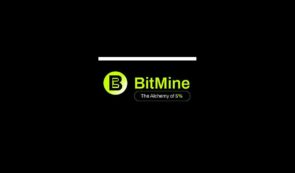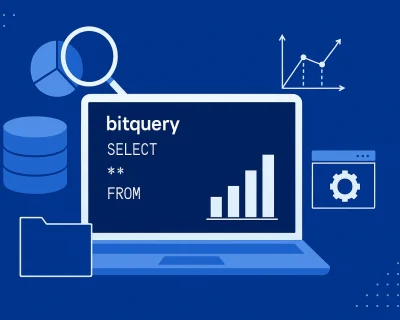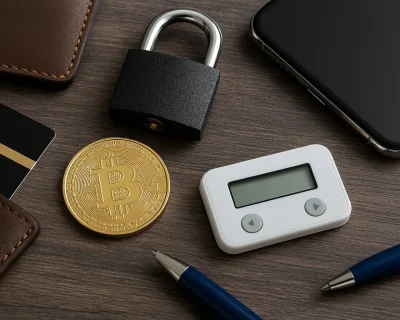Best 10 Web3 Wallets To Use in Crypto
Table of contents
In the crypto industry, ensuring the safety of your digital assets should be a top priority to have peace of mind after investing. To achieve this, selecting the right wallet must be essential.
But how do you make the right choice, and why should you consider opting for a Web3 wallet? Even if it’s not immediately apparent, picking a reliable Web3 wallet instead of a traditional crypto wallet (because, yes, they do have some differences) can save you considerable time and prevent potential issues down the road.
In this article, we’ll delve into the concept of a Web3 wallet, highlighting its distinctions from a regular crypto wallet, and help you discover the best Web3 wallet option. Let’s dive in!
What is a Web3 Wallet?
Because Web3 has strong connections to cryptocurrency, you might assume it’s the same as a crypto wallet. And we can judge that. Lots of people often use these terms interchangeably. However, you must know that crypto wallets and Web3 wallets have some differences.
As the name suggests, a cryptocurrency wallet is mainly for storing cryptocurrency. Conversely, Web3 wallets can hold other digital assets, like NFTs. Thus, Web3 wallets encompass a wider variety of assets.
So, in essence, a Web3 wallet is a digital wallet designed for interacting with decentralized Web3 applications, securely storing private keys for blockchain network access, and managing digital assets like cryptocurrencies and NFTs.
How Does a Web3 Wallet Work?
In order to understand better how Web3 wallets work, firstly, you must know that every Web3 wallet has unique features, but they all serve the same fundamental purpose.
Users create an account and receive a private key or seed phrase to get started. This key or phrase is the only way to access the user’s account, and it can’t be changed. Because it can’t be changed, writing down this information and storing it securely offline is crucial not to lose your assets deposited into your Web3 wallet.
Once a Web3 wallet is set up and has generated these private keys, you can begin to interact with blockchain networks. This includes sending, receiving, storing digital assets, and engaging with smart contracts.
Moreover, some wallets even allow users to connect directly to the blockchain or a trading platform, making buying cryptocurrencies and other assets easy.
It’s important to note that these wallets usually prioritize self-custody, which means you have control over your assets with minimal restrictions. While some platforms might have a few usage restrictions, most Web3 wallets enable users to carry out permanent and irreversible transactions according to their preferences.
Types of Web3 Wallets
Now that you’ve understood what a Web3 wallet is and how it works, it’s worth noting that there are various kinds of Web3 wallets. These wallet types can be grouped into categories, much like how we categorize crypto wallets. These wallets are distinguished based on the following factors:
a) User asset control and ownership – Custodial and Non-Custodial Wallets;
b) Storage method and internet connectivity – Hot and Cold Wallets.
Custodial and Non-Custodial Wallets
Custodial Wallets
You can associate custodial wallets with crypto bank accounts in the sense that they are managed by a third party, such as an exchange. They handle your private keys, public keys, and funds, providing you with a user-friendly interface for crypto management.
These wallets typically require you to complete KYC (Know-Your-Customer) verification, similar to what email providers use for account recovery. However, the catch is that you have to trust this third party with your private keys and assets. Some custodial wallets also offer features available in non-custodial wallets, like interacting with smart contracts.
Major custodial wallet services are usually provided by well-known crypto exchanges such as Binance, Coinbase, and Kraken.
Non-Custodial Wallets
Non-custodial wallets, also called self-custodial wallets, give you complete control and ownership over your private keys and digital assets. You have full custody of your assets and the freedom to adjust your privacy settings. You essentially “own” and safeguard your private keys and asset security.
Major non-custodial wallet services include Trust Wallet, Exodus, and MetaMask.
Hot and Cold Wallets
Hot Wallets
A hot wallet (usually associated with software wallets) is always connected to the internet, making it less secure but user-friendly. Active traders often prefer them and are commonly found on exchange platforms, although variations exist.
New traders often find hot wallets more convenient because they don’t need to transfer funds to another storage device.
Hot wallets typically come in a few types:
- Desktop Wallets – These can be downloaded and installed on your computer, regardless of your operating system.
- Online Wallets – Online wallets operate on the cloud, providing great accessibility from almost anywhere in the world as long as you have an internet connection.
- Mobile Wallet – Mobile wallets are designed to run on smartphones and are highly convenient due to the ubiquity of mobile devices.
Cold Wallets
Cold wallets are a secure way to store digital assets offline when you’re not actively using them. Even if you’re actively trading cryptocurrencies, many decentralized finance (DeFi) apps recommend using a cold wallet for long-term asset storage. Cold wallets are often less vulnerable to scams because they are offline most of the time.
Cold wallets come in two main types:
- Hardware Wallets – These are your top choice regarding security, especially if you plan to hold cryptocurrencies for the long term.
- Paper Wallets – As the name suggests, paper wallets let you print and store your private key and public keys, usually in the form of QR codes.
Top 8 Web3 Wallets in 2023
We will look at some of the best wallets from both hardware and software wallet categories to make it easier for you when choosing the perfect Web3 wallet.
Top Web3 Hardware Wallets in 2023
1. Trezor Wallet
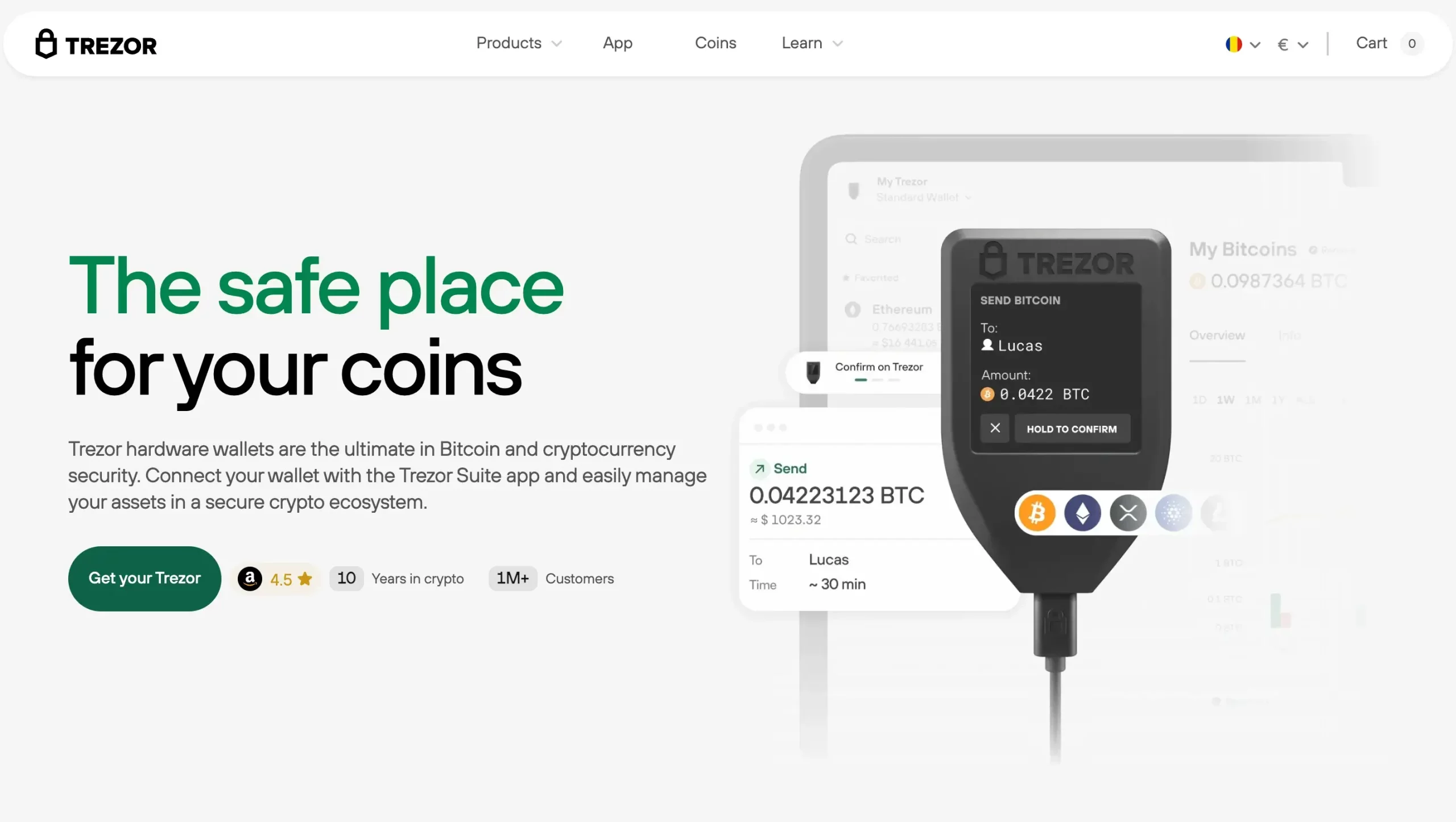
Our top choice for a Web3 hardware wallet is Trezor, and when we say Trezor, we’re referring to any of the wallet models provided by this company.
Trezor is a leading hardware wallet option, well-known for its excellent security measures in safeguarding valuable cryptocurrencies.
Trezor’s primary goal is to protect private keys and minimize the risks associated with online exposure. It performs this by combining the physical hardware device with a user-friendly web-based application for managing the wallet.
Trezor follows a traditional approach regarding setup functionalities, making it a prominent player in the hardware wallet market. It includes essential features such as setting up key pairs, generating recovery seeds, utilizing a two-interface transaction signing system and adding an extra layer of security with a PIN-Passphrase combination.
Regarding hardware, Trezor relies on the STM32 microcontroller, which undergoes community-based audits to ensure transparency and security.
Moreover, what truly distinguishes Trezor is its use of open-source software. It fosters collaboration and allows users to verify the authenticity and security of their software, instilling a greater sense of trust.
Speaking about supported assets, Trezor offers native support for over 40 cryptocurrencies on the Trezor Model T and more than 12 cryptocurrencies on the Trezor Model One. It is also compatible with all ERC-20 tokens.
Also, Trezor hardware wallets can be used for storing other cryptocurrencies and NFTs, but they may require management through third-party wallet interfaces like MetaMask. So, even if it does not allow the purchase of NFTs directly, they can be stored on the wallet, thus being a Web3 wallet.
2. SafePal S1

Our second choice for a top Web3 hardware wallet is the SafePal S1.
SafePal S1 is a hardware wallet that focuses on security and privacy, making it a dependable solution for safeguarding and managing digital assets.
Developed with support from Binance, SafePal offers an intuitive user interface and a range of features tailored to cater to the needs of cryptocurrency enthusiasts.
To manage SafePal products, users can rely on the SafePal app, a central hub for storing and conducting crypto transactions. The wallet simplifies the setup process by generating a pool of keys upon activation, and it strongly advises users to record the recovery seed for enhanced security securely. Transactions are executed offline through QR code scanning, reducing the exposure to online threats.
Furthermore, SafePal enhances security with a PIN-passphrase combination.
Prioritizing security, SafePal boasts a long-lasting battery and operates without USB, WiFi, or Bluetooth connectivity. This design choice significantly reduces the risk of remote attacks and unauthorized access by eliminating the necessity for wireless connections.
The SafePal wallet supports 61+ blockchain networks and provides unlimited storage for various cryptocurrencies, including Bitcoin, Ethereum, Polygon, and many other crypto coins and tokens.
Additionally, SafePal is compatible with NFTs on numerous blockchains like Ethereum, BEP20, Polygon, Near, Solana, and more to receive, send, view, and manage your NFT assets easily and conveniently.
3. NGRAVE ZERO
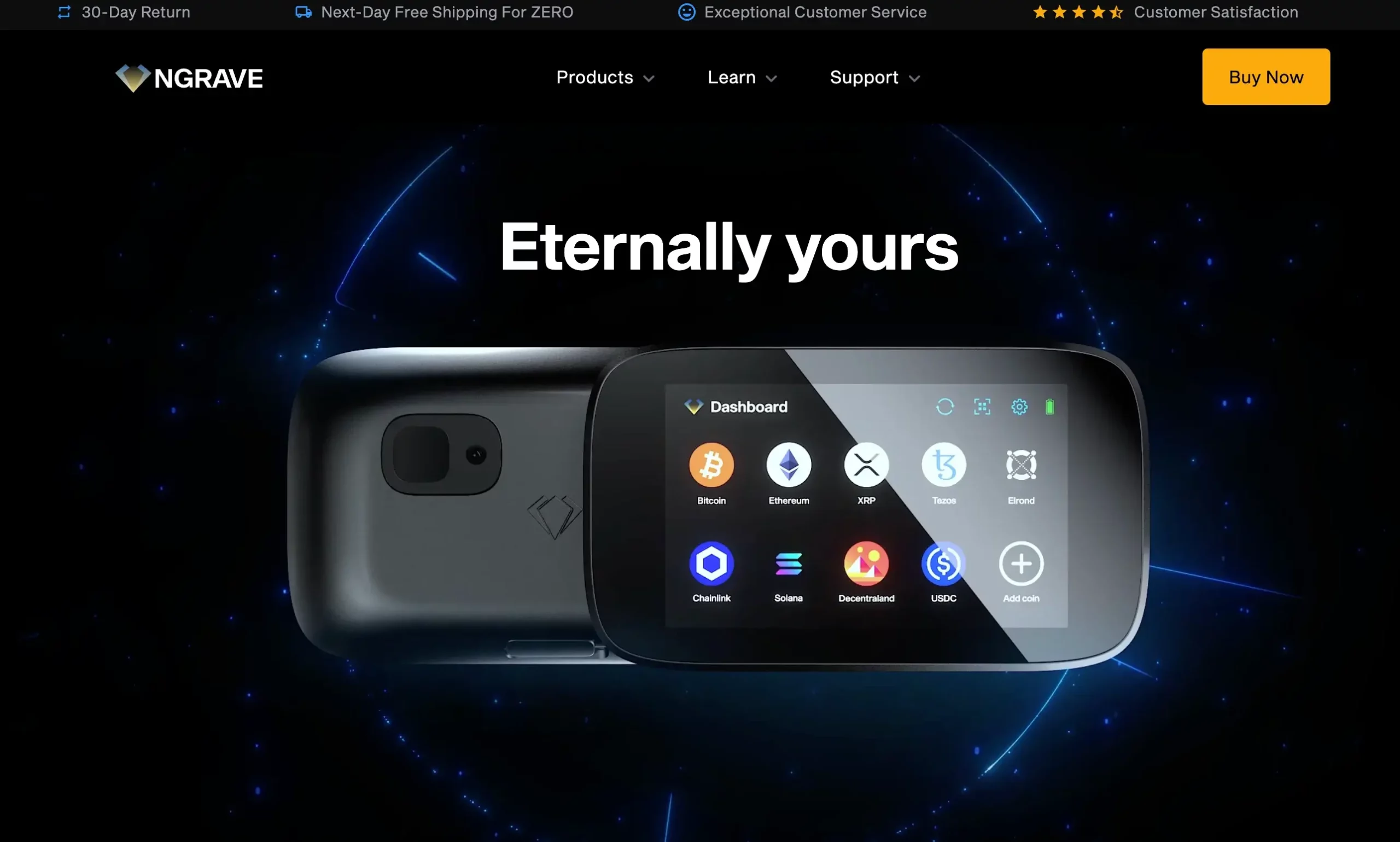
The NGRAVE ZERO wallet differentiates itself as one of the most secure options available, prioritizing strong protection by completely disconnecting from the internet to eliminate potential vulnerabilities. Thus, it is promoted as the “coldest” wallet ever created.
It operates using a QR-code method and relies on a dedicated offline transaction processing mobile app for added security.
As a clear alternative to other wallets, NGRAVE offers several key advantages. The device boasts a design built for military-grade durability and reliability.
Moreover, the NGRAVE ZERO wallet is the first to achieve the prestigious EAL7 certification, underscoring its unwavering commitment to top-tier security.
It incorporates the ARM TrustZone, an integrated integrity verifier that continuously scanning for potential threats.
NGRAVE introduces the cutting-edge NGRAVE Perfect Key technology, which securely generates private keys, providing additional protection. Moreover, NGRAVE wallets are capable of functioning independently without the need for physical connections or internet access. The wallet’s app only connects to the internet when users initiate transactions, significantly reducing exposure to potential risks.
Related to cryptocurrencies supported, NGRAVE offers native support for 16 cryptocurrencies, including Bitcoin, Dash, MultiversX, and others. It is also compatible with all tokens on the Ethereum network (ERC-20 tokens) and the MultiversX network (ESDT tokens). Furthermore, NGRAVE supports the storage of all NFTs on the Ethereum network.
4. Ledger Wallet
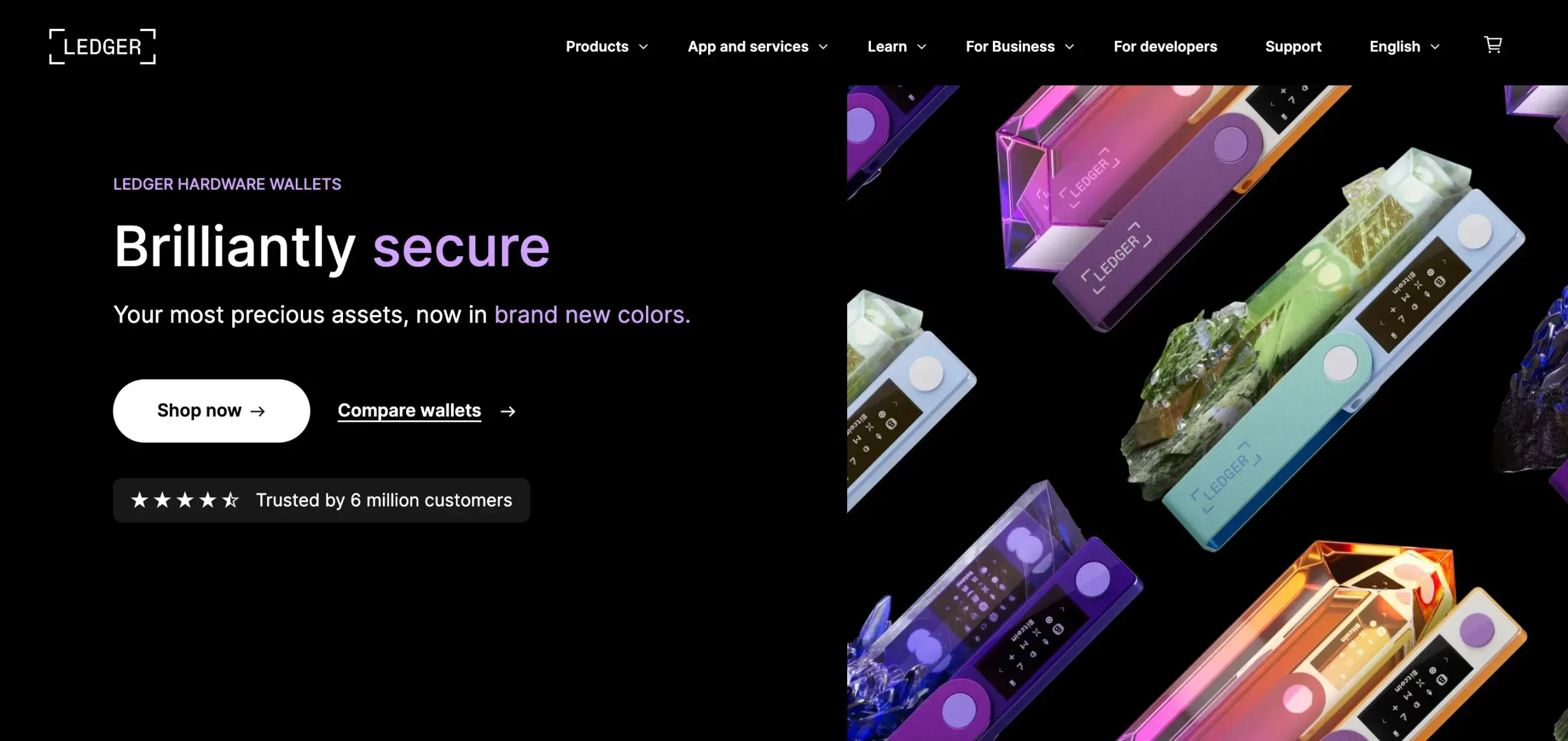
While recent events related to Ledger controversies have raised concerns, Ledger still maintains its position as one of the top hardware wallets available today, even if it isn’t our first choice.
Ledger Wallets (Nano S, Nano X, or others) are known for their strong security features and user-friendly design, making them an excellent choice for storing and managing cryptocurrencies.
With Ledger, you don’t need to be a tech expert to securely manage your digital assets because Ledger makes it accessible to everyone.
The company employs advanced encryption techniques to protect users’ sensitive information.
The Ledger Wallet can be used for various purposes, such as buying, selling, sending, storing, staking, and managing cryptocurrencies or NFTs. In order to use this hardware wallet properly, you’ll need to download the Ledger Live app. Because Ledger functions as both a desktop wallet and mobile wallet, you can download the app on your PC or phone.
Ledger offers native support for over 50 cryptocurrencies and compatibility for all ERC-20 tokens and select BEP-20 tokens.
Top Web3 Software Wallets in 2023
5. MetaMask
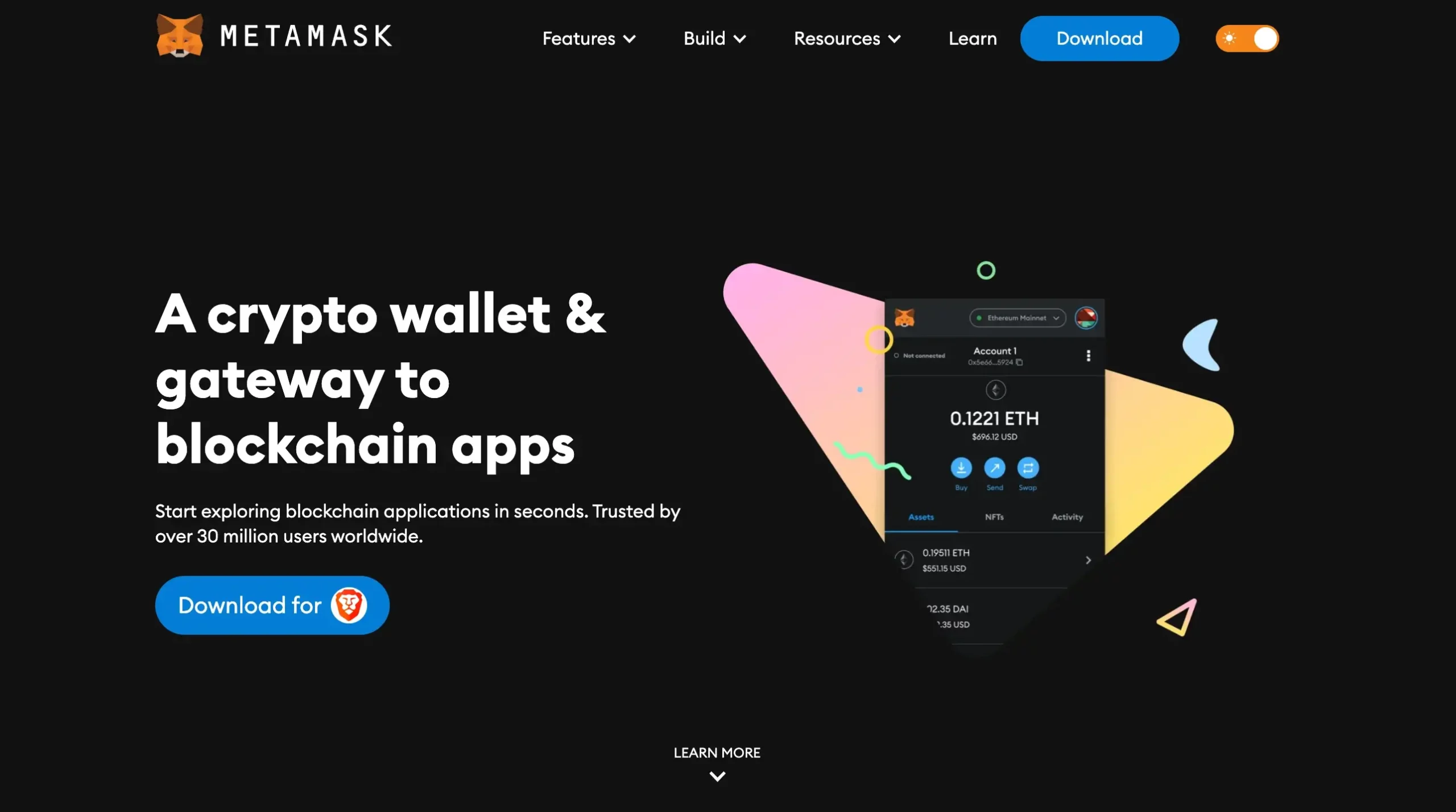
MetaMask debuted in 2016 as a non-custodial cryptocurrency wallet designed for interacting with the Ethereum blockchain, being developed by ConsenSys.
It has become the most widely used non-custodial crypto wallet globally, boasting an impressive user base of over 30 million monthly active users, and surely it’s our best choice related to software wallets.
MetaMask has cultivated a robust community, with millions of downloads and a wealth of resources dedicated to advancing the project.
Using MetaMask ensures the swift and secure generation of keys and passwords on your devices. Importantly, you retain exclusive access to your data and accounts, giving you control over what information you keep private or share.
One of MetaMask’s features is its availability as a browser extension or mobile app.
While MetaMask supports NFTs, it’s important to note that this feature is available only on the MetaMask Mobile app. In terms of cryptocurrencies, MetaMask provides support for ETH and any tokens based on the Ethereum network, including ERC-20 and ERC-721 tokens.
Additionally, it facilitates the secure transfer of cryptocurrencies and offers convenient conversion into stablecoins.
6. Trust Wallet
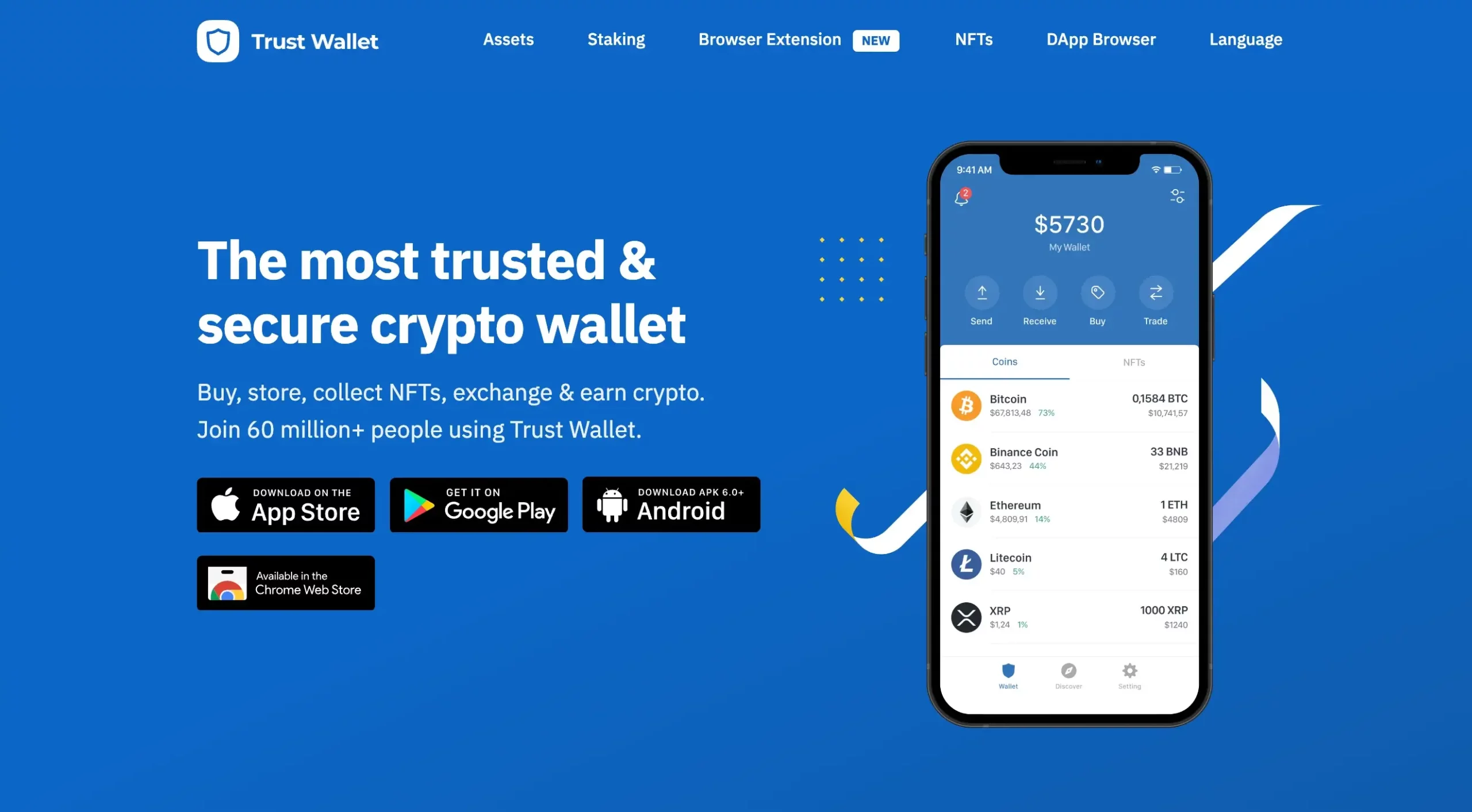
Trust Wallet is a decentralized, non-custodial multi asset mobile wallet that puts you in full control of your cryptocurrencies and NFTs. What sets it apart is its endorsement by Binance, serving as the official cryptocurrency wallet with its support since its inception.
One differentiating feature of this wallet is its access to decentralized applications (dApps). This unique capability allows for safe interactions with various dApps across diverse blockchains. With Trust Wallet, you can perform actions like buying, sending, receiving, staking, trading, and securely storing cryptocurrencies.
As a hot wallet, Trust Wallet maintains an internet connection, ensuring convenient access to your funds anytime and anywhere you have an internet connection.
Trust Wallet is accessible as a mobile wallet, available for download on your mobile device, and as a browser extension. It supports over 65 blockchains and more than 4.5 million digital assets.
7. Exodus Wallet
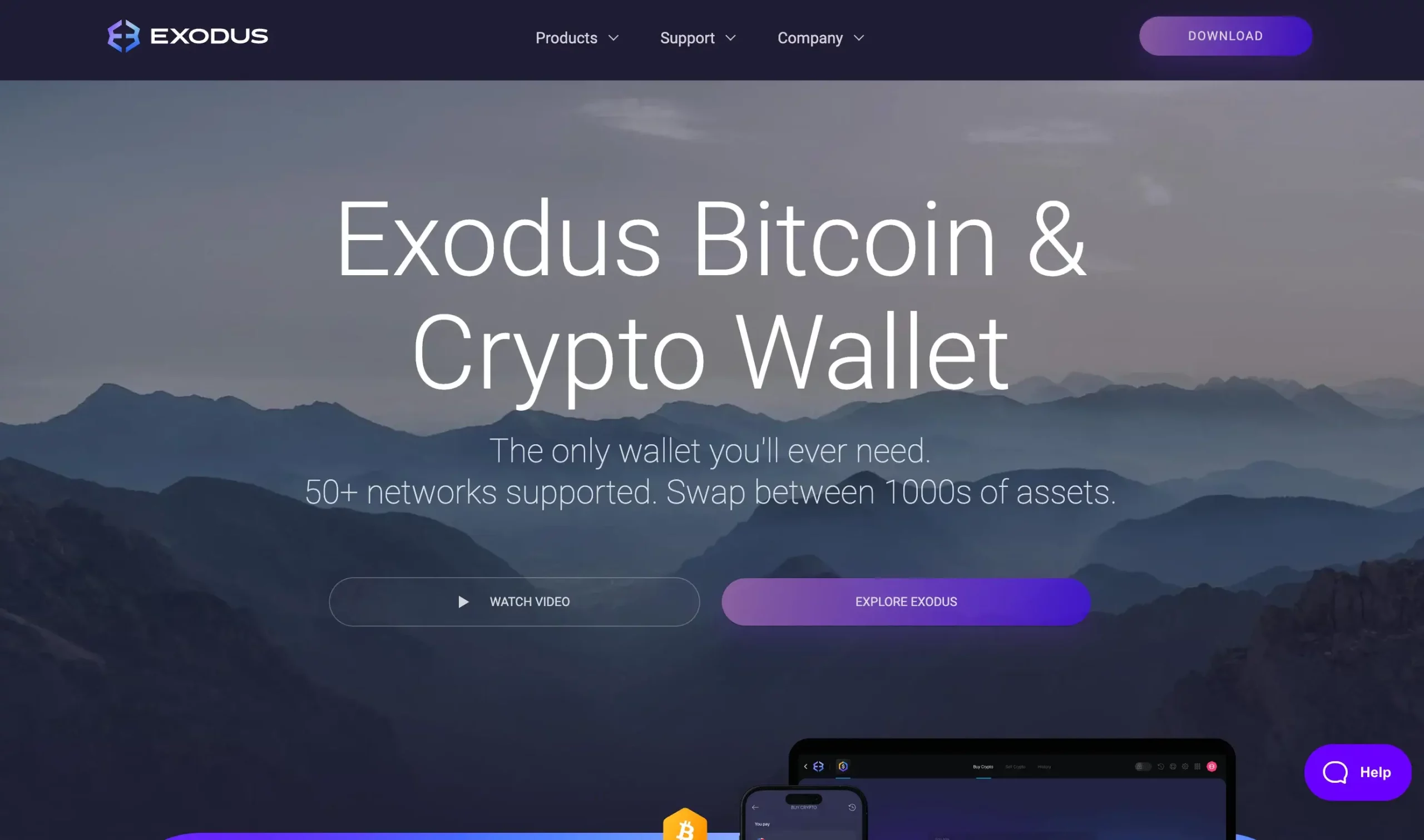
It’s not as well-known as MetaMask or Trust Wallet, but Exodus is for sure an excellent choice for those entering into crypto. Its user-friendly interface, high-security standards, and cross-platform compatibility make it an attractive option for beginners.
One standout feature is its exceptional customer support, providing users with chat and email assistance and an extensive knowledge base. Setting up Exodus on both desktop and mobile devices is straightforward, with a simple 12-word seed phrase serving as a recovery method. Users can sync their desktop and mobile wallets with a QR code.
Exodus prioritizes user privacy by not requiring Know Your Customer (KYC) information and facilitates anonymous transactions.
Exodus is a beginner-friendly Web3 wallet that combines usability, broad asset support, and robust security measures. Its support for staking, decentralized applications (dApps), and NFTs enhances its appeal to users looking to explore the diverse aspects of the cryptocurrency ecosystem.
With over 364 supported cryptocurrencies, including Bitcoin and Ethereum, it caters to a wide range of digital asset enthusiasts.
8. Coinbase Wallet
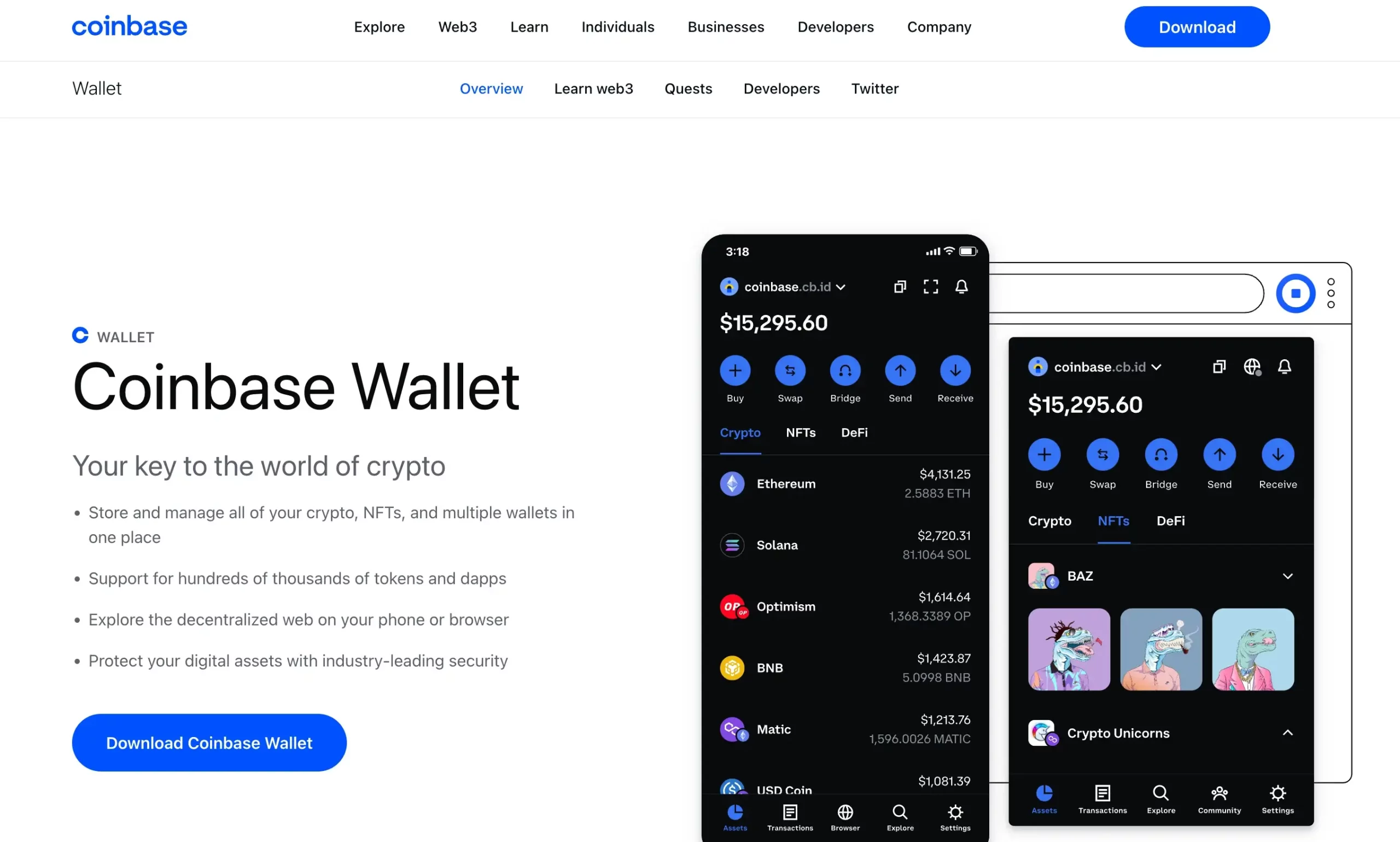
Last but not least, Coinbase Wallet. Introduced in 2018, is an online cryptocurrency wallet that gives users control over their digital assets (so it’s a hot wallet). It’s strongly linked to the Coinbase crypto exchange, leveraging its renowned safety features, making it one of the most secure crypto wallets available.
With this wallet, users can store their digital currencies and access decentralized applications (dApps) on both the Bitcoin and Ethereum networks. What’s particularly noteworthy is that it can connect with other hardware crypto wallets, providing an extra layer of security to safeguard your assets.
For added peace of mind, Coinbase Wallet benefits from FDIC insurance, covering up to $250,000 of your fiat currency. You can access it through any modern web browser or on an iOS or Android device. Additionally, it offers enhanced security options like Two Factor Authentication and compatibility with Google Authenticator.
This wallet supports a wide range of cryptocurrencies and is also equipped to handle NFTs, making it a versatile Web3 wallet for various digital assets.
FAQ
How Many Types of Web3 Wallets Are There?
Currently, there are several types of Web3 wallets. In the crypto industry, you will hear of hardware wallets, software wallet, desktop wallets, mobile wallets, cold wallets, and hot wallets. Keep in mind that there are other types of Web3 wallets, but these are the most common, and remember that a wallet can fall into several categories.
Which are The Best Web3 Wallets?
Depending on your preferences, if you prefer Web3 hardware wallets, you can turn to Trezor Wallet, SafaPal S1, NGRAVE ZERO, Ledger Wallet. On the other hand, if you prefer a Web3 software wallet, you can use MetaMask, Trust Wallet, Exodus Wallet or Coinbase Wallet.
Final Thoughts
Today, choosing the right Web3 wallet becomes a paramount decision for safeguarding your cryptocurrency investments.
Understanding the nuances between different wallet types, from custodial to non-custodial and hot to cold wallet, or specific issues related to wallets in general, such as understanding what a private key is, empowers you to make an informed choice that aligns with your specific needs.
However, remember that the choice of the best Web3 wallet boils down to your individual preferences, security requirements, and asset management needs.
Whether you opt for the robust security of a hardware wallet or the accessibility of a software wallet, remember that safeguarding your private key remains paramount. And if you’re interested in exploring the exciting possibilities of Web3 applications and digital assets, you’re well-equipped with these versatile wallets by your side.



